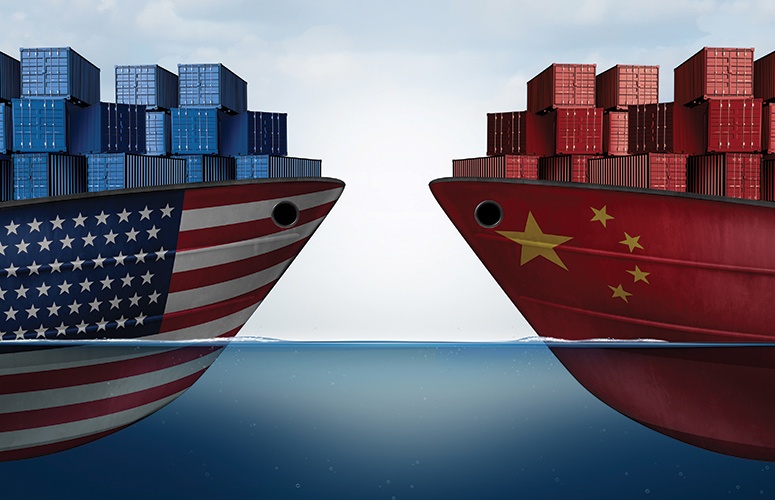
Bankers Discuss Trade Tariff Impacts
Is it too soon to tell what may transpire in today’s alleged trade war environment?
By Anthony Birritteri, Editor-in-Chief On Nov 6, 2018Amidst ongoing trade tariff disputes between the US and various other countries, New Jersey Business magazine asks two executives from the state’s banking industry how they see the ongoing trade battle playing out among their business clients.
As a quick review on what has transpired to date, earlier this year, the Trump administration imposed a 25 percent tariff on steel and a 10 percent tariff on aluminum imports from China and other nations, many of which have traditionally been close US allies (and the move against many of these US allies was made in the name of national security, according to the Trump administration). A short time after the initial declaration, certain nations, including Argentina, Australia, Brazil, South Korea, and EU countries, were exempt from these tariffs.
Meanwhile, the recently negotiated United States-Mexico-Canada Agreement (the pending replacement of the North American Free Trade Agreement, which goes into effect in 2020 and still requires Congressional approval), does not, at press-time, eliminate a 25 percent tariff on Canadian and Mexican steel.
Additionally, the US had imposed overall tariffs on $250 billion worth of Chinese goods (initially $50 billion with an additional $200 billion announced this past September). China, in turn, said it would impose tariffs of $60 billion on more than 5,000 US imports. In the continuing tit-for-tat, the Trump administration then threatened another round of tariffs on China valued at $267 billion.
The trade war with China emerged because of the record high $375-billion US trade deficit with China (2017 numbers), and what many experts claim are China’s unfair trade practices – and its theft of US intellectual property.
In fact, business experts, economists and government leaders would not argue the fact that China’s trade policies with the US have been unfair. However, the bankers we interviewed see business complications in this current trade war.
“Tariffs will be most directly felt by New Jersey’s retailers and wholesalers who source products from China, and who are either raising prices to pass their cost on to consumers or shrinking margins to absorb it themselves,” says Bill Adams, senior economist at PNC Financial Services Group. “In addition, New Jersey businesses that sell to China will be affected by retaliatory tariffs and informal measures to discourage Chinese customers from buying American. Tariffs are also raising the cost of construction materials, contributing to a slower year for residential investment and home sales.”
Dorothy Kahlau, first senior vice president, department head of commercial loans at Valley National Bank, says her business clients are saying that the only effect tariffs are having is that their increased pricing is being passed on to customers. “That will obviously trickle to the consumer level,” she says. “It will affect overall costs of goods and business. At some point, companies may need to decide if some of the burden of the tariffs will get shifted to employees in terms of salary and wage reductions or employment cuts. I don’t know … we are not there yet.”
She does say that the warehouse market in New Jersey is currently “hot.” What is sitting in those warehouses? Consumer products. “So, if the price of those products goes up and people stop buying, those warehouses could either be filled with consumer goods that aren’t moving, or could, at some point, be vacant and not needed. … But that’s extreme,” she says.
Conversely, Kahlau mentions one particular manufacturing client that is dependent on steel and which is also partially owned by Chinese interests, that is discussing whether to move manufacturing from China to the US. “It will continue to buy certain parts from China, ship them to the US, and use them in products here. So, in this case, it appears that the desired effect of the tariffs is partially there, partially not.”
Asked if tariffs would reduce bank lending due to increased risk, or increase the cost of capital on loans to businesses in the state, Kahlau says, “Obviously, any increase in risk would affect either the cost of capital (i.e., a rise in interest rates) or decrease our lending appetite.
“I would indicate that early on, several of our commercial borrowers actually borrowed more (we increased our line of credit availability) in order to purchase inventory in advance of the tariff effective date,” she adds.
Adams warns that a trade war was among the principal causes of the Great Depression. “This is a risk that economists take very seriously,” he says. “But aside from the US, most foreign governments are still working to lower barriers to trade among themselves, not raise them. So, a global trade war seems very unlikely at the present moment.”



